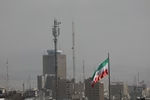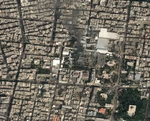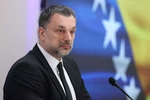
Israel carried out a series of airstrikes early Monday against Iranian targets in Syria, the Israeli military said, in response to an Iranian missile fired at the Golan Heights, capping off a volatile 24 hours between the two regional enemies with the possibility of more fighting ahead.
The Israel Defense Forces (IDF) struck Iranian targets in and around Damascus, including the city's international airport, IDF Spokesman Lt. Col. Jonathan Conricus said.
The overnight strikes targeted munitions depots, intelligence sites, a training camp and more, Conricus said.
The IDF also struck Iranian warehouses at the Damascus International Airport, Conricus said, noting that Israel observed secondary explosions, indicating that weapons had been hit. Israel also attacked Syrian anti-aircraft batteries when those batteries fired dozens of missiles at Israeli aircraft carrying out the strikes, Conricus said.
Israel relayed a message to Syria that the military was only targeting Iranian forces and warned Syria not to fire at Israeli jets.
The wide-ranging strikes were in response to a medium range surface-to-surface missile fired toward the Israeli-occupied Golan Heights on Sunday afternoon. Iran made the missile and launched by Iranian forces, Conricus said, adding that it's the first time kilometres with such a payload has been fired by Iranian forces at Israel.
The missile was fired from an area near Damascus, Conricus said, which is approximately 50 kilometers from the Golan Heights.
Russia had assured Israel that no Iranian forces would be this close to Israel, according to Conricus. Russian state media agency RIA-Novosti reported four Syrian soldiers were killed and another six wounded in the Israeli strikes, citing Russia's defence control centre.
The London-based Syrian Observatory for Human Rights (SOHR) said 11 were killed in the strike, including 2 Syrian nationals. The SOHR described the Israeli attack as the "most intense and violent attack against the regime forces and their allies in terms of casualties since May 2018," when Israel carried out a large-scale attack on Iranian targets in Syria following dozens of rockets launched from Syria toward Israel.
Israel accused Iran of firing the rockets. But Iran's state-run FARS news agency denied that any casualties had taken place and reported that Syrian air defences managed to intercept seven Israeli missiles fired into Syrian territory.
Syrian air defences destroyed more than 30 cruise missiles and guided air bombs in the course of repelling the attack, Russian state media reported.
The head of Iran's air force, Brig. Gen. Aziz Nasirzadeh, said Iran was growing impatient to fight Israel and promised to destroy the "Zionist regime."
"The young people in the air force are fully ready and impatient to confront the Zionist regime and eliminate it from the Earth," said Nasirzadeh, quoted by the Young Journalists Club, a website supervised by state television.
Israel's military remains on elevated alert in the north and the ski area in the Golan Heights has been closed, but there are no other restrictions on civilian movement, Conricus said.
The IDF hinted that military activity could continue, saying it was "prepared for all scenarios and will continue operating as needed to defend Israeli civilians."
Kakvo je tvoje mišljenje o ovome?
Učestvuj u diskusiji ili pročitaj komentare





 Srbija
Srbija
 Hrvatska
Hrvatska
 Slovenija
Slovenija



























































